Unit 4 Don't eat in class 单元测试题(含答案)
文档属性
| 名称 | Unit 4 Don't eat in class 单元测试题(含答案) | 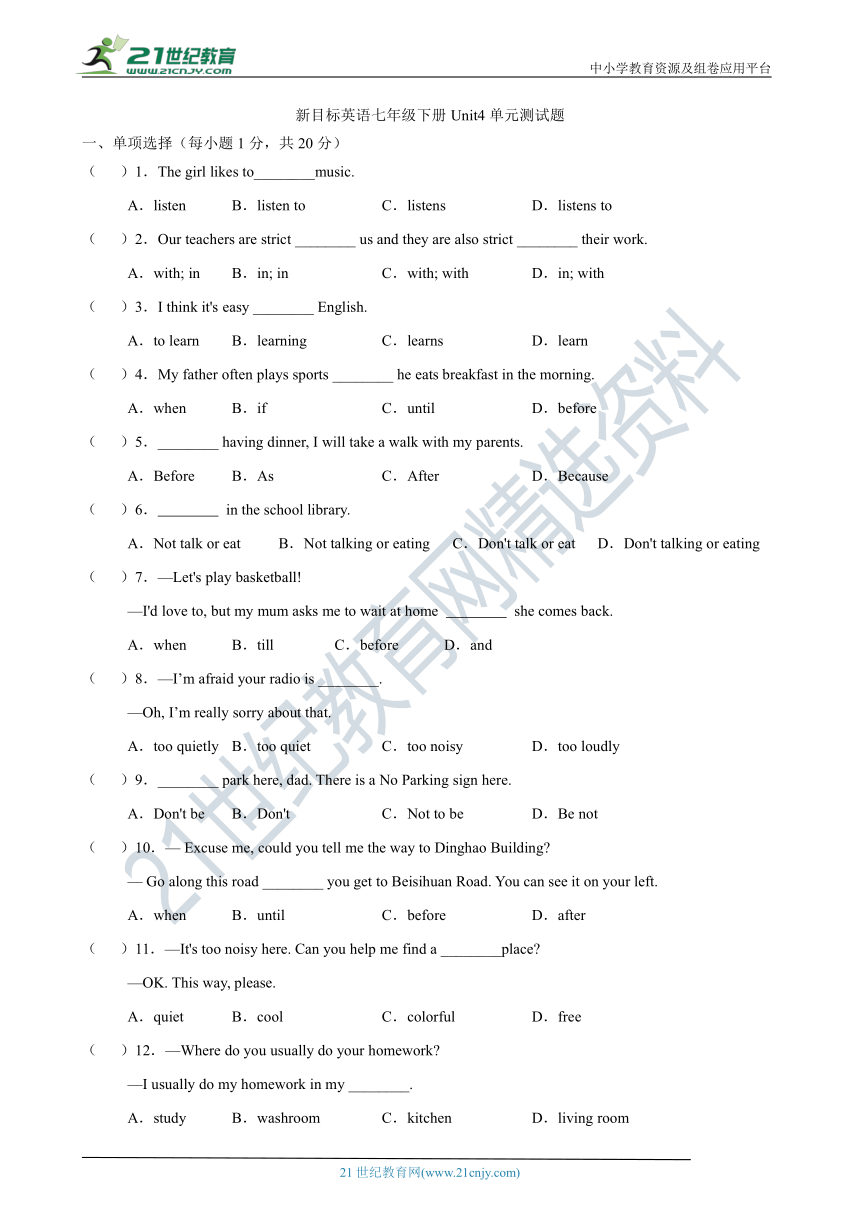 | |
| 格式 | doc | ||
| 文件大小 | 1.3MB | ||
| 资源类型 | 试卷 | ||
| 版本资源 | 人教新目标(Go for it)版 | ||
| 科目 | 英语 | ||
| 更新时间 | 2021-04-07 19:42:10 | ||
图片预览

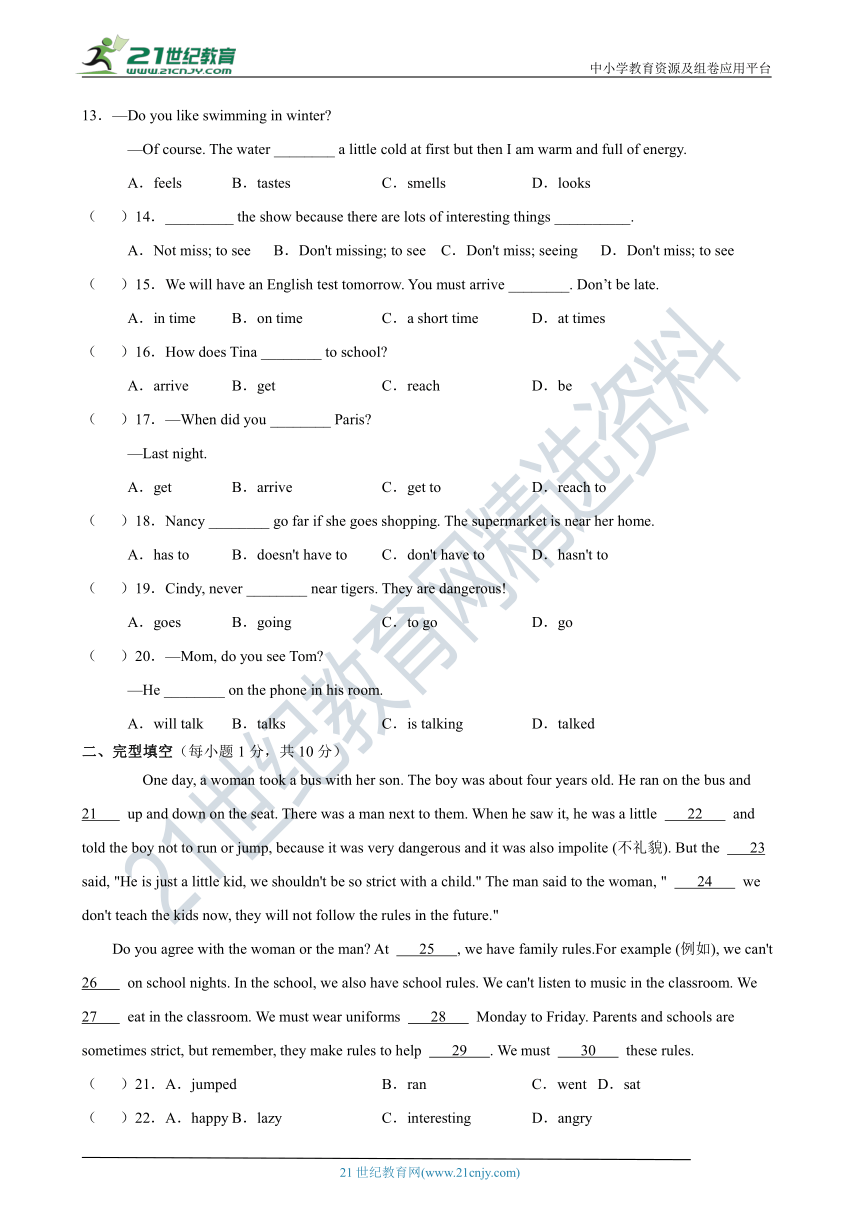
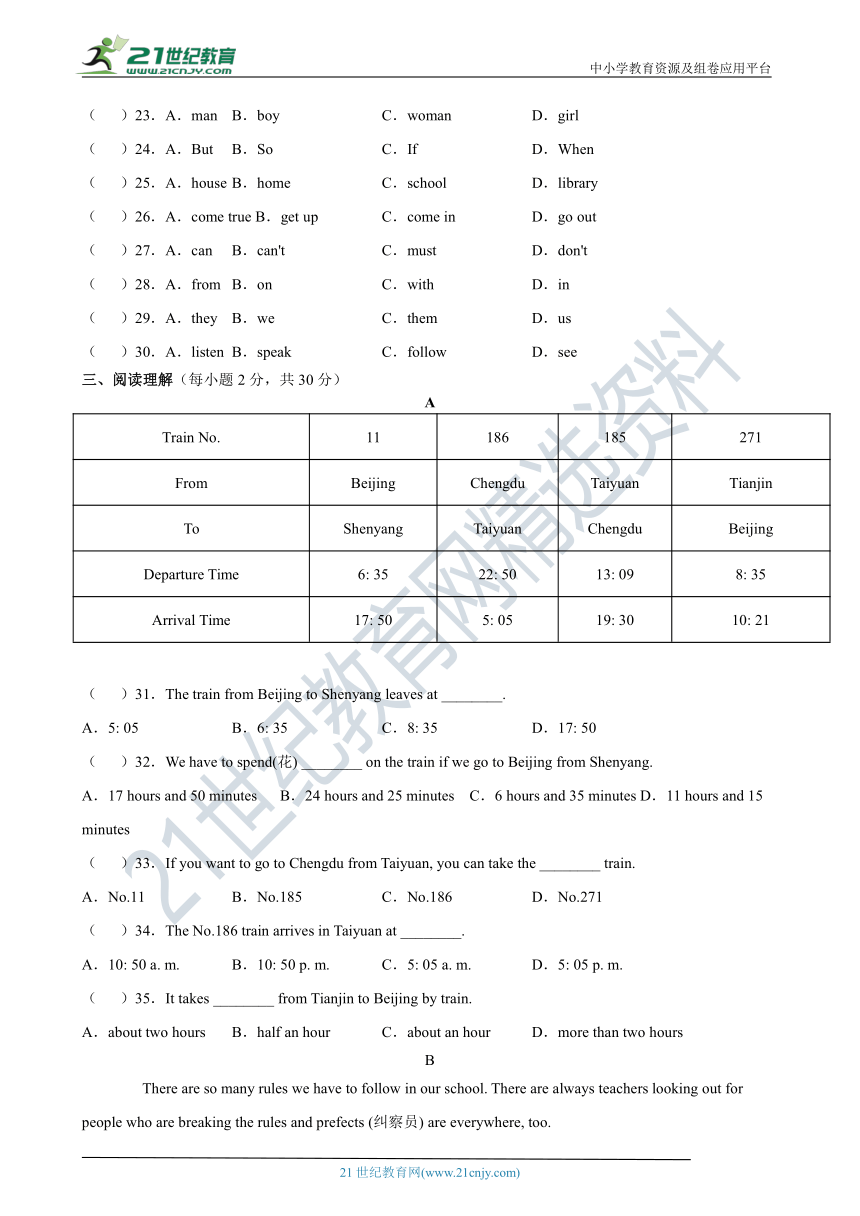
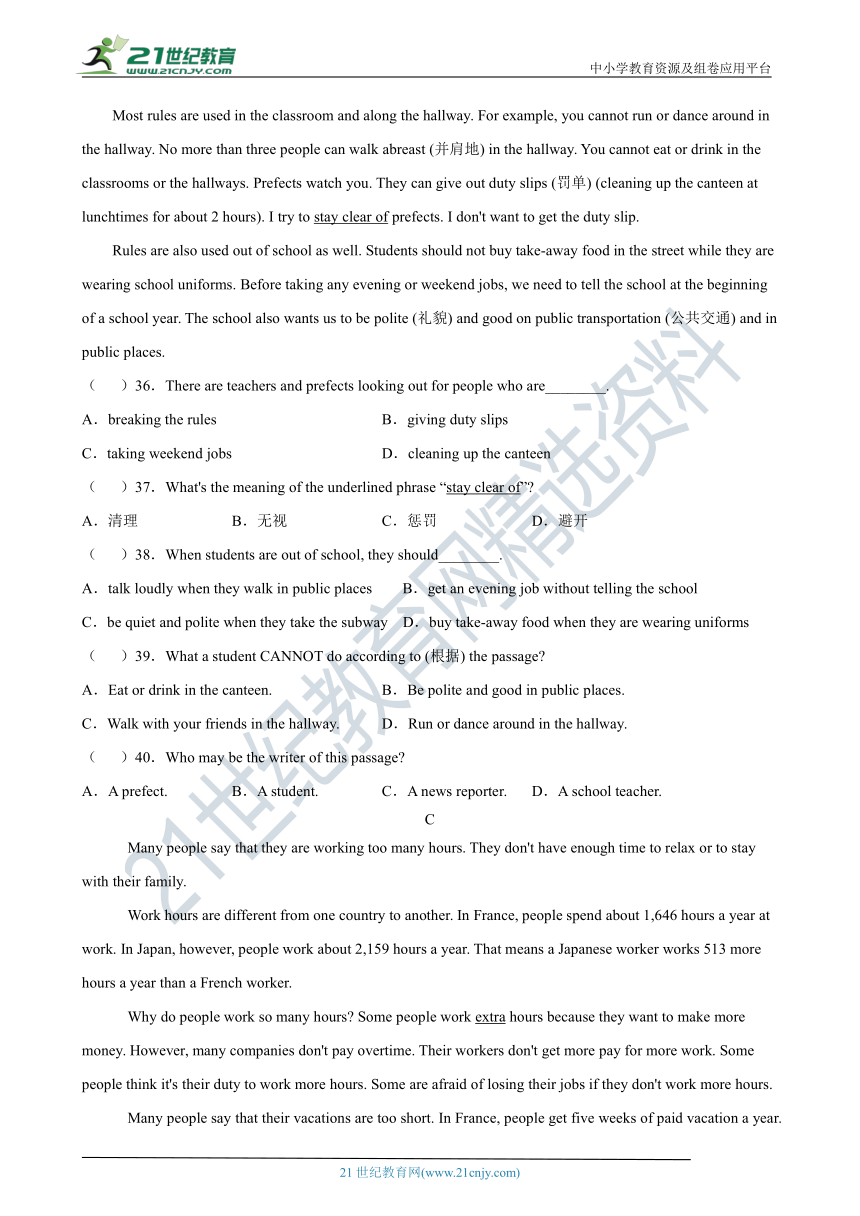
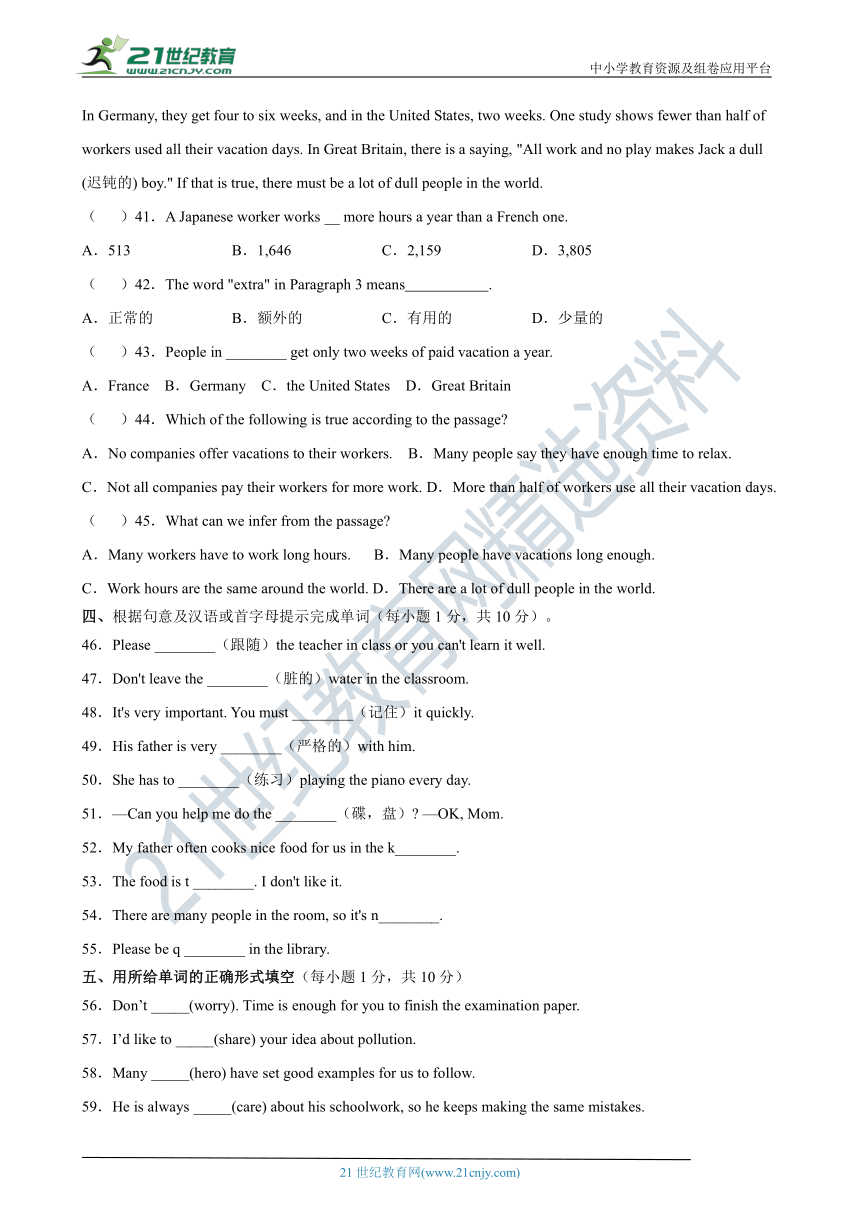
文档简介
中小学教育资源及组卷应用平台
新目标英语七年级下册Unit4单元测试题
一、单项选择(每小题1分,共20分)
( )1.The girl likes to________music.
A.listen B.listen to C.listens D.listens to
( )2.Our teachers are strict ________ us and they are also strict ________ their work.
A.with; in B.in; in C.with; with D.in; with
( )3.I think it's easy ________ English.
A.to learn B.learning C.learns D.learn
( )4.My father often plays sports ________ he eats breakfast in the morning.
A.when B.if C.until D.before
( )5.________ having dinner, I will take a walk with my parents.
A.Before B.As C.After D.Because
( )6. in the school library.
A.Not talk or eat B.Not talking or eating C.Don't talk or eat D.Don't talking or eating
( )7.—Let's play basketball!
—I'd love to, but my mum asks me to wait at home she comes back.
A.when B.till C.before D.and
( )8.—I’m afraid your radio is ________.
—Oh, I’m really sorry about that.
A.too quietly B.too quiet C.too noisy D.too loudly
( )9.________ park here, dad. There is a No Parking sign here.
A.Don't be B.Don't C.Not to be D.Be not
( )10.— Excuse me, could you tell me the way to Dinghao Building?
— Go along this road ________ you get to Beisihuan Road. You can see it on your left.
A.when B.until C.before D.after
( )11.—It's too noisy here. Can you help me find a ________place?
—OK. This way, please.
A.quiet B.cool C.colorful D.free
( )12.—Where do you usually do your homework?
—I usually do my homework in my ________.
A.study B.washroom C.kitchen D.living room
13.—Do you like swimming in winter?
—Of course. The water ________ a little cold at first but then I am warm and full of energy.
A.feels B.tastes C.smells D.looks
( )14._________ the show because there are lots of interesting things __________.
A.Not miss; to see B.Don't missing; to see C.Don't miss; seeing D.Don't miss; to see
( )15.We will have an English test tomorrow. You must arrive ________. Don’t be late.
A.in time B.on time C.a short time D.at times
( )16.How does Tina ________ to school?
A.arrive B.get C.reach D.be
( )17.—When did you ________ Paris?
—Last night.
A.get B.arrive C.get to D.reach to
( )18.Nancy ________ go far if she goes shopping. The supermarket is near her home.
A.has to B.doesn't have to C.don't have to D.hasn't to
( )19.Cindy, never ________ near tigers. They are dangerous!
A.goes B.going C.to go D.go
( )20.—Mom, do you see Tom?
—He ________ on the phone in his room.
A.will talk B.talks C.is talking D.talked
二、完型填空(每小题1分,共10分)
One day, a woman took a bus with her son. The boy was about four years old. He ran on the bus and 21 up and down on the seat. There was a man next to them. When he saw it, he was a little 22 and told the boy not to run or jump, because it was very dangerous and it was also impolite (不礼貌). But the 23 said, "He is just a little kid, we shouldn't be so strict with a child." The man said to the woman, " 24 we don't teach the kids now, they will not follow the rules in the future."
Do you agree with the woman or the man? At 25 , we have family rules.For example (例如), we can't 26 on school nights. In the school, we also have school rules. We can't listen to music in the classroom. We 27 eat in the classroom. We must wear uniforms 28 Monday to Friday. Parents and schools are sometimes strict, but remember, they make rules to help 29 . We must 30 these rules.
( )21.A.jumped B.ran C.went D.sat
( )22.A.happy B.lazy C.interesting D.angry
( )23.A.man B.boy C.woman D.girl
( )24.A.But B.So C.If D.When
( )25.A.house B.home C.school D.library
( )26.A.come true B.get up C.come in D.go out
( )27.A.can B.can't C.must D.don't
( )28.A.from B.on C.with D.in
( )29.A.they B.we C.them D.us
( )30.A.listen B.speak C.follow D.see
阅读理解(每小题2分,共30分)
A
Train No. 11 186 185 271
From Beijing Chengdu Taiyuan Tianjin
To Shenyang Taiyuan Chengdu Beijing
Departure Time 6: 35 22: 50 13: 09 8: 35
Arrival Time 17: 50 5: 05 19: 30 10: 21
( )31.The train from Beijing to Shenyang leaves at ________.
A.5: 05 B.6: 35 C.8: 35 D.17: 50
( )32.We have to spend(花) ________ on the train if we go to Beijing from Shenyang.
A.17 hours and 50 minutes B.24 hours and 25 minutes C.6 hours and 35 minutes D.11 hours and 15 minutes
( )33.If you want to go to Chengdu from Taiyuan, you can take the ________ train.
A.No.11 B.No.185 C.No.186 D.No.271
( )34.The No.186 train arrives in Taiyuan at ________.
A.10: 50 a. m. B.10: 50 p. m. C.5: 05 a. m. D.5: 05 p. m.
( )35.It takes ________ from Tianjin to Beijing by train.
A.about two hours B.half an hour C.about an hour D.more than two hours
B
There are so many rules we have to follow in our school. There are always teachers looking out for people who are breaking the rules and prefects (纠察员) are everywhere, too.
Most rules are used in the classroom and along the hallway. For example, you cannot run or dance around in the hallway. No more than three people can walk abreast (并肩地) in the hallway. You cannot eat or drink in the classrooms or the hallways. Prefects watch you. They can give out duty slips (罚单) (cleaning up the canteen at lunchtimes for about 2 hours). I try to stay clear of prefects. I don't want to get the duty slip.
Rules are also used out of school as well. Students should not buy take-away food in the street while they are wearing school uniforms. Before taking any evening or weekend jobs, we need to tell the school at the beginning of a school year. The school also wants us to be polite (礼貌) and good on public transportation (公共交通) and in public places.
( )36.There are teachers and prefects looking out for people who are________.
A.breaking the rules B.giving duty slips
C.taking weekend jobs D.cleaning up the canteen
( )37.What's the meaning of the underlined phrase “stay clear of”?
A.清理 B.无视 C.惩罚 D.避开
( )38.When students are out of school, they should________.
A.talk loudly when they walk in public places B.get an evening job without telling the school
C.be quiet and polite when they take the subway D.buy take-away food when they are wearing uniforms
( )39.What a student CANNOT do according to (根据) the passage?
A.Eat or drink in the canteen. B.Be polite and good in public places.
C.Walk with your friends in the hallway. D.Run or dance around in the hallway.
( )40.Who may be the writer of this passage?
A.A prefect. B.A student. C.A news reporter. D.A school teacher.
C
Many people say that they are working too many hours. They don't have enough time to relax or to stay with their family.
Work hours are different from one country to another. In France, people spend about 1,646 hours a year at work. In Japan, however, people work about 2,159 hours a year. That means a Japanese worker works 513 more hours a year than a French worker.
Why do people work so many hours? Some people work extra hours because they want to make more money. However, many companies don't pay overtime. Their workers don't get more pay for more work. Some people think it's their duty to work more hours. Some are afraid of losing their jobs if they don't work more hours.
Many people say that their vacations are too short. In France, people get five weeks of paid vacation a year. In Germany, they get four to six weeks, and in the United States, two weeks. One study shows fewer than half of workers used all their vacation days. In Great Britain, there is a saying, "All work and no play makes Jack a dull (迟钝的) boy." If that is true, there must be a lot of dull people in the world.
( )41.A Japanese worker works __ more hours a year than a French one.
A.513 B.1,646 C.2,159 D.3,805
( )42.The word "extra" in Paragraph 3 means .
A.正常的 B.额外的 C.有用的 D.少量的
( )43.People in ________ get only two weeks of paid vacation a year.
A.France B.Germany C.the United States D.Great Britain
( )44.Which of the following is true according to the passage?
A.No companies offer vacations to their workers. B.Many people say they have enough time to relax.
C.Not all companies pay their workers for more work. D.More than half of workers use all their vacation days.
( )45.What can we infer from the passage?
A.Many workers have to work long hours. B.Many people have vacations long enough.
C.Work hours are the same around the world. D.There are a lot of dull people in the world.
四、根据句意及汉语或首字母提示完成单词(每小题1分,共10分)。
46.Please ________(跟随)the teacher in class or you can't learn it well.
47.Don't leave the ________(脏的)water in the classroom.
48.It's very important. You must ________(记住)it quickly.
49.His father is very ________(严格的)with him.
50.She has to ________(练习)playing the piano every day.
51.—Can you help me do the ________(碟,盘)? —OK, Mom.
52.My father often cooks nice food for us in the k________.
53.The food is t ________. I don't like it.
54.There are many people in the room, so it's n________.
55.Please be q ________ in the library.
五、用所给单词的正确形式填空(每小题1分,共10分)
56.Don’t _____(worry). Time is enough for you to finish the examination paper.
57.I’d like to _____(share) your idea about pollution.
58.Many _____(hero) have set good examples for us to follow.
59.He is always _____(care) about his schoolwork, so he keeps making the same mistakes.
60.My mother with her friends often ______(go) shopping on weekends.
61.Two _____(three) of the students in our class have been to Disneyland somewhere.
62.It _______(believe) that tea was brought to Korea and Japan during the 6the and 7th centuries.
63.The road to _____(succeed) is to work honestly.
64.She _____(study) English in the school since she left her hometown.
65.It is _____(good) to listen than to speak.
六、完成句子(每小题2分,共10分)
66.我认为每一个人应严格要求自己。
I think everyone should be ________ themselves.
67.It's not safe to ____ (外出) at night by yourself.
68.买本字典是很重要的。
It’s ________ ________ ________ a dictionary.
69.今天下午西蒙将帮助我学习英语。
Simon _____________ this afternoon.
70.别担心英语。
Don’t ________ ________ English, believe in yourself.
七、句型转换(每小题2分,共10分)
71.You can’t be late for school again.(改为同义句)
You can’t________ ________ ________school again.
72.He has to stay at home on weekends.(改为否定句)
He________ ________to stay at home on weekends.
73.Sam has to get up at six every morning.(改为一般疑问句)
________Sam________ ________get up at six every morning?
74.I can do that well.(改为否定句)
I________ ________that well.
75.You can’t fight with anybody.(改为祈使句)
________ ________with anybody.
八、用单词的正确形式完成短文(每小题1分,共10分)
play, never, clean, because, rule, wear, read, watch, outside, late
I have lots of 76. in my family. It isn't interesting. I have to get up at six o'clock every morning. I have to 77. English for an hour every day. I can't play with my friends after school 78. I have to walk my dog. I can't 79. TV in the evening. On weekends, I have to 80. my room. Then I have to wash(洗) the clothes. After that I have to 81. the violin.
At school, we must 82. the school uniform. We can't bring music players to school. We can eat83. , but can't eat in the classroom. Of course, we can't arrive 84. for school. I 85. have any fun. What can I do?
九、书面表达(10分)
无论在家里还是在学校里, Zhao Peng总要遵守许多制度,他很苦恼,于是写信给他的好朋友Mike, 倾诉他内心的不快。请你根据汉语提示写出他的rules,然后帮他写信给Mike(不少于60词)。
(1)6: 30起床;(2)在校穿校服;(3)上课不准迟到;(4)上课时不能戴帽子;(5)在家不能看电视,每晚练钢琴;(6)9: 00上床睡觉;(7)周末打扫房间。
Zhao Peng's Rules
_________________________________________________________________________________________________________________________________________________________________________________________________________________________________________________________________________________________________________________________________________________________________________________________________________________________________________________________________________________________________________________________________________________________________________________________________________________________________________________________________________________________________________________________________________________________________________________________________________________________________________________________________________________________________________
新目标英语八年级下册Unit4单元测试题
一、单项选择(每小题1分,共20分)
1-5BAADC 6-10 CBCBB 11-15 AAADB 16-20 BCBDC
二、完型填空(每小题1分,共10分)
21-25 ADCCB 26-30 DBADC
三、阅读理解(每小题2分,共30分)
31-35BDBCA 36-40 ADCDB 41-45 ABCCA
四、根据句意及汉语或首字母提示完成单词(每小题1分,共10分)。
46.follow47.dirty48.remember49.strict50.practice
51.dishes52.kitchen53.terrible54.noisy55.quiet
六、用所给单词的正确形式填空(每小题1分,共10分)
56.worry 57.to share 58.heroes59.careless60.goes
61.thirds 62.is believed63.success64.has studied 65.better
七、用单词的正确形式完成句子(每小题1分,共10分)
66.strict with 67.go out 68.important to buy 69.will help me with/learn my English70.worry about
八、句型转换(每小题2分,共10分)
76.arrive late for77.doesn’t have78.Does,have to79.can’t do80.Don’t fight
八、用单词的正确形式完成短文(每小题1分,共10分)
81.rules82.read83.because84.watch85.clean
86.play87.wear88.outside89.late90.Never
书面表达(共10分)
Zhao Peng's Rules
Dear Mike,
I'm not happy every day. I have too many rules at school and in my house. I have to get up at 6: 30 in the morning. I have to wear uniforms at school. I can't arrive late for class. I can't wear a hat in class, either. At home I can't watch TV and I have to pratice playing the piano every night. I have to go to bed at 9: 00. At the weekends I have to clean my room. I don't have any fun every day. What shall I do?
Yours,
Zhao Peng
_21?????????è?????(www.21cnjy.com)_
新目标英语七年级下册Unit4单元测试题
一、单项选择(每小题1分,共20分)
( )1.The girl likes to________music.
A.listen B.listen to C.listens D.listens to
( )2.Our teachers are strict ________ us and they are also strict ________ their work.
A.with; in B.in; in C.with; with D.in; with
( )3.I think it's easy ________ English.
A.to learn B.learning C.learns D.learn
( )4.My father often plays sports ________ he eats breakfast in the morning.
A.when B.if C.until D.before
( )5.________ having dinner, I will take a walk with my parents.
A.Before B.As C.After D.Because
( )6. in the school library.
A.Not talk or eat B.Not talking or eating C.Don't talk or eat D.Don't talking or eating
( )7.—Let's play basketball!
—I'd love to, but my mum asks me to wait at home she comes back.
A.when B.till C.before D.and
( )8.—I’m afraid your radio is ________.
—Oh, I’m really sorry about that.
A.too quietly B.too quiet C.too noisy D.too loudly
( )9.________ park here, dad. There is a No Parking sign here.
A.Don't be B.Don't C.Not to be D.Be not
( )10.— Excuse me, could you tell me the way to Dinghao Building?
— Go along this road ________ you get to Beisihuan Road. You can see it on your left.
A.when B.until C.before D.after
( )11.—It's too noisy here. Can you help me find a ________place?
—OK. This way, please.
A.quiet B.cool C.colorful D.free
( )12.—Where do you usually do your homework?
—I usually do my homework in my ________.
A.study B.washroom C.kitchen D.living room
13.—Do you like swimming in winter?
—Of course. The water ________ a little cold at first but then I am warm and full of energy.
A.feels B.tastes C.smells D.looks
( )14._________ the show because there are lots of interesting things __________.
A.Not miss; to see B.Don't missing; to see C.Don't miss; seeing D.Don't miss; to see
( )15.We will have an English test tomorrow. You must arrive ________. Don’t be late.
A.in time B.on time C.a short time D.at times
( )16.How does Tina ________ to school?
A.arrive B.get C.reach D.be
( )17.—When did you ________ Paris?
—Last night.
A.get B.arrive C.get to D.reach to
( )18.Nancy ________ go far if she goes shopping. The supermarket is near her home.
A.has to B.doesn't have to C.don't have to D.hasn't to
( )19.Cindy, never ________ near tigers. They are dangerous!
A.goes B.going C.to go D.go
( )20.—Mom, do you see Tom?
—He ________ on the phone in his room.
A.will talk B.talks C.is talking D.talked
二、完型填空(每小题1分,共10分)
One day, a woman took a bus with her son. The boy was about four years old. He ran on the bus and 21 up and down on the seat. There was a man next to them. When he saw it, he was a little 22 and told the boy not to run or jump, because it was very dangerous and it was also impolite (不礼貌). But the 23 said, "He is just a little kid, we shouldn't be so strict with a child." The man said to the woman, " 24 we don't teach the kids now, they will not follow the rules in the future."
Do you agree with the woman or the man? At 25 , we have family rules.For example (例如), we can't 26 on school nights. In the school, we also have school rules. We can't listen to music in the classroom. We 27 eat in the classroom. We must wear uniforms 28 Monday to Friday. Parents and schools are sometimes strict, but remember, they make rules to help 29 . We must 30 these rules.
( )21.A.jumped B.ran C.went D.sat
( )22.A.happy B.lazy C.interesting D.angry
( )23.A.man B.boy C.woman D.girl
( )24.A.But B.So C.If D.When
( )25.A.house B.home C.school D.library
( )26.A.come true B.get up C.come in D.go out
( )27.A.can B.can't C.must D.don't
( )28.A.from B.on C.with D.in
( )29.A.they B.we C.them D.us
( )30.A.listen B.speak C.follow D.see
阅读理解(每小题2分,共30分)
A
Train No. 11 186 185 271
From Beijing Chengdu Taiyuan Tianjin
To Shenyang Taiyuan Chengdu Beijing
Departure Time 6: 35 22: 50 13: 09 8: 35
Arrival Time 17: 50 5: 05 19: 30 10: 21
( )31.The train from Beijing to Shenyang leaves at ________.
A.5: 05 B.6: 35 C.8: 35 D.17: 50
( )32.We have to spend(花) ________ on the train if we go to Beijing from Shenyang.
A.17 hours and 50 minutes B.24 hours and 25 minutes C.6 hours and 35 minutes D.11 hours and 15 minutes
( )33.If you want to go to Chengdu from Taiyuan, you can take the ________ train.
A.No.11 B.No.185 C.No.186 D.No.271
( )34.The No.186 train arrives in Taiyuan at ________.
A.10: 50 a. m. B.10: 50 p. m. C.5: 05 a. m. D.5: 05 p. m.
( )35.It takes ________ from Tianjin to Beijing by train.
A.about two hours B.half an hour C.about an hour D.more than two hours
B
There are so many rules we have to follow in our school. There are always teachers looking out for people who are breaking the rules and prefects (纠察员) are everywhere, too.
Most rules are used in the classroom and along the hallway. For example, you cannot run or dance around in the hallway. No more than three people can walk abreast (并肩地) in the hallway. You cannot eat or drink in the classrooms or the hallways. Prefects watch you. They can give out duty slips (罚单) (cleaning up the canteen at lunchtimes for about 2 hours). I try to stay clear of prefects. I don't want to get the duty slip.
Rules are also used out of school as well. Students should not buy take-away food in the street while they are wearing school uniforms. Before taking any evening or weekend jobs, we need to tell the school at the beginning of a school year. The school also wants us to be polite (礼貌) and good on public transportation (公共交通) and in public places.
( )36.There are teachers and prefects looking out for people who are________.
A.breaking the rules B.giving duty slips
C.taking weekend jobs D.cleaning up the canteen
( )37.What's the meaning of the underlined phrase “stay clear of”?
A.清理 B.无视 C.惩罚 D.避开
( )38.When students are out of school, they should________.
A.talk loudly when they walk in public places B.get an evening job without telling the school
C.be quiet and polite when they take the subway D.buy take-away food when they are wearing uniforms
( )39.What a student CANNOT do according to (根据) the passage?
A.Eat or drink in the canteen. B.Be polite and good in public places.
C.Walk with your friends in the hallway. D.Run or dance around in the hallway.
( )40.Who may be the writer of this passage?
A.A prefect. B.A student. C.A news reporter. D.A school teacher.
C
Many people say that they are working too many hours. They don't have enough time to relax or to stay with their family.
Work hours are different from one country to another. In France, people spend about 1,646 hours a year at work. In Japan, however, people work about 2,159 hours a year. That means a Japanese worker works 513 more hours a year than a French worker.
Why do people work so many hours? Some people work extra hours because they want to make more money. However, many companies don't pay overtime. Their workers don't get more pay for more work. Some people think it's their duty to work more hours. Some are afraid of losing their jobs if they don't work more hours.
Many people say that their vacations are too short. In France, people get five weeks of paid vacation a year. In Germany, they get four to six weeks, and in the United States, two weeks. One study shows fewer than half of workers used all their vacation days. In Great Britain, there is a saying, "All work and no play makes Jack a dull (迟钝的) boy." If that is true, there must be a lot of dull people in the world.
( )41.A Japanese worker works __ more hours a year than a French one.
A.513 B.1,646 C.2,159 D.3,805
( )42.The word "extra" in Paragraph 3 means .
A.正常的 B.额外的 C.有用的 D.少量的
( )43.People in ________ get only two weeks of paid vacation a year.
A.France B.Germany C.the United States D.Great Britain
( )44.Which of the following is true according to the passage?
A.No companies offer vacations to their workers. B.Many people say they have enough time to relax.
C.Not all companies pay their workers for more work. D.More than half of workers use all their vacation days.
( )45.What can we infer from the passage?
A.Many workers have to work long hours. B.Many people have vacations long enough.
C.Work hours are the same around the world. D.There are a lot of dull people in the world.
四、根据句意及汉语或首字母提示完成单词(每小题1分,共10分)。
46.Please ________(跟随)the teacher in class or you can't learn it well.
47.Don't leave the ________(脏的)water in the classroom.
48.It's very important. You must ________(记住)it quickly.
49.His father is very ________(严格的)with him.
50.She has to ________(练习)playing the piano every day.
51.—Can you help me do the ________(碟,盘)? —OK, Mom.
52.My father often cooks nice food for us in the k________.
53.The food is t ________. I don't like it.
54.There are many people in the room, so it's n________.
55.Please be q ________ in the library.
五、用所给单词的正确形式填空(每小题1分,共10分)
56.Don’t _____(worry). Time is enough for you to finish the examination paper.
57.I’d like to _____(share) your idea about pollution.
58.Many _____(hero) have set good examples for us to follow.
59.He is always _____(care) about his schoolwork, so he keeps making the same mistakes.
60.My mother with her friends often ______(go) shopping on weekends.
61.Two _____(three) of the students in our class have been to Disneyland somewhere.
62.It _______(believe) that tea was brought to Korea and Japan during the 6the and 7th centuries.
63.The road to _____(succeed) is to work honestly.
64.She _____(study) English in the school since she left her hometown.
65.It is _____(good) to listen than to speak.
六、完成句子(每小题2分,共10分)
66.我认为每一个人应严格要求自己。
I think everyone should be ________ themselves.
67.It's not safe to ____ (外出) at night by yourself.
68.买本字典是很重要的。
It’s ________ ________ ________ a dictionary.
69.今天下午西蒙将帮助我学习英语。
Simon _____________ this afternoon.
70.别担心英语。
Don’t ________ ________ English, believe in yourself.
七、句型转换(每小题2分,共10分)
71.You can’t be late for school again.(改为同义句)
You can’t________ ________ ________school again.
72.He has to stay at home on weekends.(改为否定句)
He________ ________to stay at home on weekends.
73.Sam has to get up at six every morning.(改为一般疑问句)
________Sam________ ________get up at six every morning?
74.I can do that well.(改为否定句)
I________ ________that well.
75.You can’t fight with anybody.(改为祈使句)
________ ________with anybody.
八、用单词的正确形式完成短文(每小题1分,共10分)
play, never, clean, because, rule, wear, read, watch, outside, late
I have lots of 76. in my family. It isn't interesting. I have to get up at six o'clock every morning. I have to 77. English for an hour every day. I can't play with my friends after school 78. I have to walk my dog. I can't 79. TV in the evening. On weekends, I have to 80. my room. Then I have to wash(洗) the clothes. After that I have to 81. the violin.
At school, we must 82. the school uniform. We can't bring music players to school. We can eat83. , but can't eat in the classroom. Of course, we can't arrive 84. for school. I 85. have any fun. What can I do?
九、书面表达(10分)
无论在家里还是在学校里, Zhao Peng总要遵守许多制度,他很苦恼,于是写信给他的好朋友Mike, 倾诉他内心的不快。请你根据汉语提示写出他的rules,然后帮他写信给Mike(不少于60词)。
(1)6: 30起床;(2)在校穿校服;(3)上课不准迟到;(4)上课时不能戴帽子;(5)在家不能看电视,每晚练钢琴;(6)9: 00上床睡觉;(7)周末打扫房间。
Zhao Peng's Rules
_________________________________________________________________________________________________________________________________________________________________________________________________________________________________________________________________________________________________________________________________________________________________________________________________________________________________________________________________________________________________________________________________________________________________________________________________________________________________________________________________________________________________________________________________________________________________________________________________________________________________________________________________________________________________________
新目标英语八年级下册Unit4单元测试题
一、单项选择(每小题1分,共20分)
1-5BAADC 6-10 CBCBB 11-15 AAADB 16-20 BCBDC
二、完型填空(每小题1分,共10分)
21-25 ADCCB 26-30 DBADC
三、阅读理解(每小题2分,共30分)
31-35BDBCA 36-40 ADCDB 41-45 ABCCA
四、根据句意及汉语或首字母提示完成单词(每小题1分,共10分)。
46.follow47.dirty48.remember49.strict50.practice
51.dishes52.kitchen53.terrible54.noisy55.quiet
六、用所给单词的正确形式填空(每小题1分,共10分)
56.worry 57.to share 58.heroes59.careless60.goes
61.thirds 62.is believed63.success64.has studied 65.better
七、用单词的正确形式完成句子(每小题1分,共10分)
66.strict with 67.go out 68.important to buy 69.will help me with/learn my English70.worry about
八、句型转换(每小题2分,共10分)
76.arrive late for77.doesn’t have78.Does,have to79.can’t do80.Don’t fight
八、用单词的正确形式完成短文(每小题1分,共10分)
81.rules82.read83.because84.watch85.clean
86.play87.wear88.outside89.late90.Never
书面表达(共10分)
Zhao Peng's Rules
Dear Mike,
I'm not happy every day. I have too many rules at school and in my house. I have to get up at 6: 30 in the morning. I have to wear uniforms at school. I can't arrive late for class. I can't wear a hat in class, either. At home I can't watch TV and I have to pratice playing the piano every night. I have to go to bed at 9: 00. At the weekends I have to clean my room. I don't have any fun every day. What shall I do?
Yours,
Zhao Peng
_21?????????è?????(www.21cnjy.com)_
同课章节目录
- Unit 1 Can you play the guitar?
- Section A
- Section B
- Unit 2 What time do you go to school?
- Section A
- Section B
- Unit 3 How do you get to school?
- Section A
- Section B
- Unit 4 Don't eat in class.
- Section A
- Section B
- Unit 5 Why do you like pandas?
- Section A
- Section B
- Unit 6 I'm watching TV.
- Section A
- Section B
- Review of Units 1-6
- Unit 7 It's raining!
- Section A
- Section B
- Unit 8 Is there a post office near here?
- Section A
- Section B
- Unit 9 What does he look like?
- Section A
- Section B
- Unit 10 I'd like some noodles.
- Section A
- Section B
- Unit 11 How was your school trip?
- Section A
- Section B
- Unit 12 What did you do last weekend?
- Section A
- Section B
